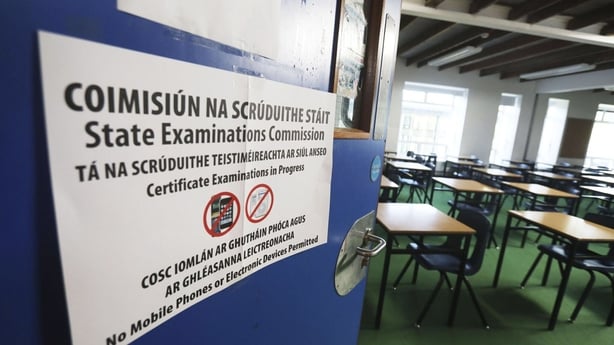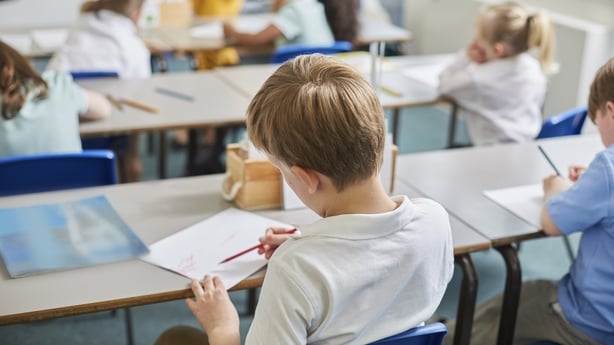Seeing through what promises to be the biggest change to Senior Cycle education here in 100 years is among the top challenges that will face new Minister for Education and Youth Helen McEntee.
From this coming September the next four years will see a profound revamping across all Leaving Certificate subjects to shift the balance away from a focus on terminal exams towards continuous assessment.
Helen McEntee's predecessor Norma Foley (herself a former secondary school teacher) believed the change would allow for a more holistic and deeper experience of learning for students, and reduce the stress associated with the Leaving Certificate, but many teachers feel the change is far too rushed.
They worry about a potential diminution in the quality of learning, and equity, and some fear that the challenges posed by AI have not been thoroughly assessed. Some are concerned too that the changes will actually increase stress for students. Their unions, the ASTI and the TUI have called for a delay in implementation.

The changes are imminent, due to come into effect for 5th year students from September in seven subjects, including business, biology, physics and chemistry, and it seems unlikely they will be altered, but there is a precedent. Within weeks of his appointment in 2018, former minister for education Joe McHugh set about reversing a decision made as part of Junior Cycle reform - to remove history as a core subject at that level.
Phone pouches
While Senior Cycle reform plans are problematic for some, it seems difficult to find anyone in education circles who did not have a problem with last year’s budget decision to ring fence €9 million for schools to purchase phone pouches.
While everyone supports a ban on the use of smartphones in schools, trade union and school management representatives who were involved in pre-budget talks with the department, where the sector petitioned for additional funds for a range of needs, continue to wonder where the idea to allocate €9 million in this way came from.

They say they are not aware of any education stakeholder body that requested such a measure. This week, just before the new Government was formed, the Department of Education published a tender for the pouches. But the plan continues to be scoffed at by many. It will be interesting to see what Helen McEntee's view will be on this.
Survey on school ethos
In census 2022 the parents of one quarter of children under the age of four ticked either the 'no religion’ box or ticked no box at all when asked about their child's religious affiliation, if any. That means that very soon, one-in-four children attending primary school here are likely to be of no religion at all. Yet 95% of our primary schools continue to have a religious ethos, with the vast majority of those run by the Catholic church.
An ambitious target was set by the last government to treble the number of multi-denominational primary schools here by 2030, but under the 33rd Dáil barely any progress towards this goal was achieved.
To reach this goal some Catholic primary schools will have to transfer to a multi-denominational ethos and efforts to persuade local communities to support such change have run aground in recent years, with processes in the words of one Department of Education inspector "troubled by suspicions and a lack of trust from an early stage".
Late last year, in what would have been a renewed attempt to move forward, the Department of Education was poised to roll out a national survey of parents, to gauge their wishes on school ethos. But the election stalled that. Parents and others who wish to see change will be hoping to see these long-awaited surveys rolled out now as soon as possible.
Special needs
Children with special needs and their families continue to face a myriad of barriers when it comes to accessing the education they are entitled to.
A dire shortage of school places - in both special schools and in special classes attached to mainstream schools - continues, despite the creation under the last government of a significant number of additional places.
In most schools also there is a complete absence of the kind of therapies these children need in order to be able to access education. There are challenges in addressing this, not least a severe skills shortage in these areas.
During the election issues related to the education of children with special needs was one of the biggest education issues raised with politicians on the doorsteps. The new Government has promised to continue to work to address these barriers.
Class size
Almost one in ten children attending mainstream primary schools here are being educated in classes of 30 or more pupils.
A Department of Education census for the last academic school year reveals that 49,324 primary school children were in classes of between 30 to 34 pupils, while 1,704 children were being educated in classes of between 35 to 39 pupils.

In its Programme For Government, the new administration has promised to bring the pupil teacher ratio down from 23 to one to 19 to one. Will it deliver, and will this result in fewer children sitting in super-sized classrooms?
New minister, new name
Interestingly, with the new minister comes a new title. The Minister for Education is now Minister for Education and Youth.
It seems fitting to connect the two. Schools play a unique role in the lives of young people, one that increasingly goes beyond the strict confines of academic learning. They are where the State first encounters the child - independent of its family - on a regular basis.
It is school staff who may be the first for instance to spot if a young person is at risk for example. In an increasingly complex world, where social media has opened up a vast world of unfiltered influences for young people, the steadying role that educational institutions can play should not be underestimated.
On Friday evening, Minister McEntee issued a short statement.
She said she was "determined to ensure we continue to have one of the best educational systems in the world.
"This will include a focus on curriculum reform, innovation in our schools and tackling educational disadvantage.
"Minister McEntee will work with teachers and staff to support children and young people to fulfil their full potential, with a particular focus on children with additional needs", her statement said.







